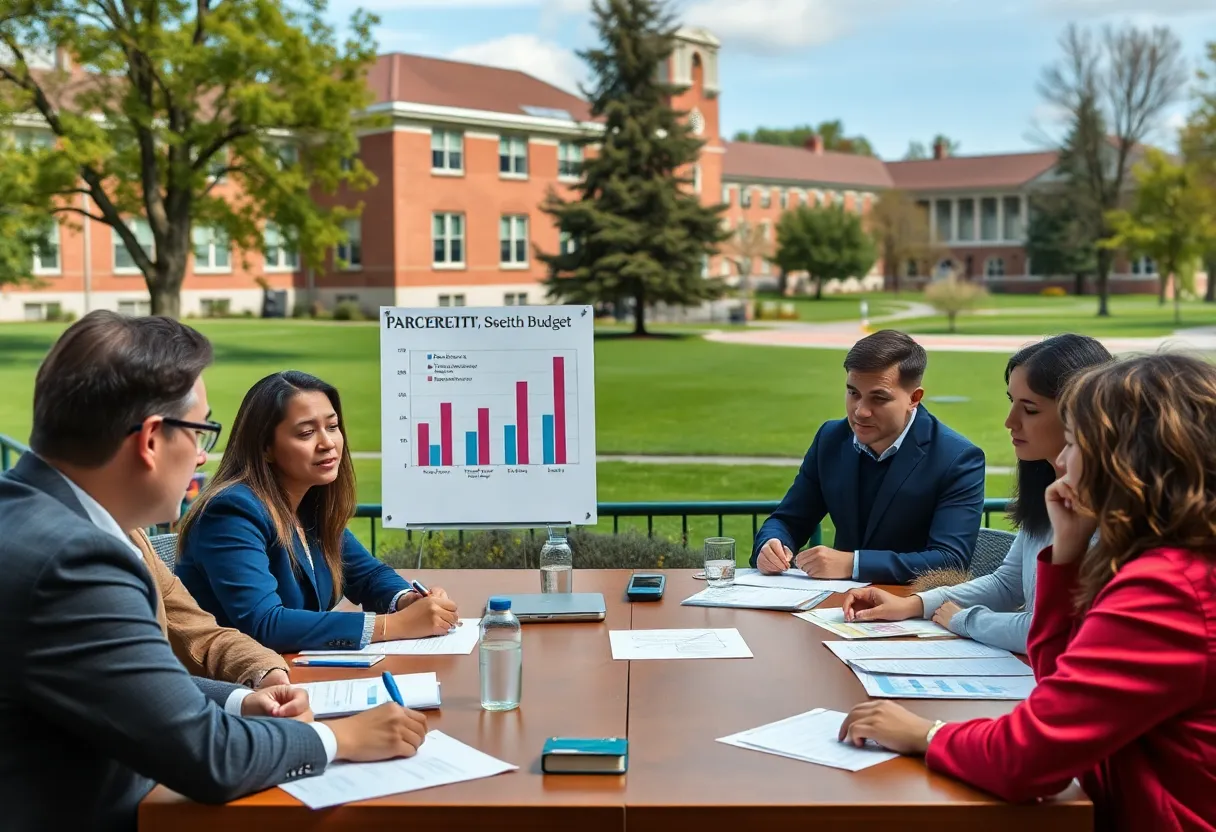Omaha, October 4, 2025
The University of Nebraska at Lincoln (UNL) has launched budget hearings to address a projected $15 million deficit due to declining enrollment and reduced state funding. The hearings aim to assess programs at risk of cuts while emphasizing the importance of high-impact areas like STEM and agriculture. Faculty and student involvement will be crucial as the university navigates these financial challenges and seeks to maintain academic integrity amid necessary cuts.
UNL Initiates Budget Hearings Amid Financial Challenges in Omaha
Omaha, NE – The University of Nebraska at Lincoln (UNL) has begun a series of budget hearings to evaluate programs at risk of cuts due to ongoing financial difficulties caused by declining enrollment and reduced state funding. These hearings started today and aim to guide decisions on reallocating resources to sustain the university’s core strengths.
Focus on Strategic Priorities
UNL Chancellor Rodney Bennett addressed faculty and students at the opening session, stressing the importance of these hearings in identifying high-impact areas such as STEM and agriculture programs. The process will involve affected departments presenting their value in terms of research contributions and community engagement over the next two weeks. This approach seeks to balance immediate fiscal needs with long-term academic goals.
Impacts on Humanities and Social Sciences
Several programs in the humanities and social sciences face potential reductions, prompting organized responses from student groups. These advocates have emphasized the role of diverse curricula in fostering cultural awareness and have raised concerns about the broader implications of such changes, including possible losses to the university’s intellectual diversity. Discussions during the hearings will explore ways to mitigate these effects while addressing the budget gap.
Root Causes of the Budget Deficit
The university’s projected $15 million budget deficit arises from economic shifts following the pandemic, including persistent enrollment drops and cuts in state appropriations. These factors have strained resources across Nebraska’s public higher education system, forcing institutions like UNL to scrutinize operational costs and funding models. Officials note that without adjustments, the deficit could deepen, affecting everything from faculty hiring to student services.
Efforts to Protect Faculty Positions
Faculty unions are actively involved, negotiating to safeguard tenure-track positions amid the uncertainty. These talks highlight tensions between cost-saving measures and maintaining a stable academic workforce. The hearings provide a platform for input from all stakeholders, ensuring that decisions reflect a comprehensive view of the university’s needs.
Potential for Future Growth and Partnerships
Despite the challenges, university leaders view these hearings as an opportunity to realign priorities that could lead to innovative solutions. Plans include exploring new collaborations with technology firms in Omaha’s growing innovation district, potentially bringing in additional revenue through joint research initiatives and grants. Such partnerships could bolster fields like engineering and data sciences, aligning with regional economic demands.
Broader Context in Nebraska Higher Education
UNL’s situation mirrors wider trends in state-funded universities, where enrollment fluctuations and funding constraints have prompted similar reviews elsewhere in Nebraska. The hearings are part of a larger strategy to enhance efficiency without compromising educational quality. For instance, investments in online learning platforms and targeted scholarships aim to reverse enrollment declines by attracting a broader student base, including those from out-of-state and international markets.
The budget process at UNL underscores the evolving landscape of public higher education, where institutions must adapt to fiscal realities while preserving their missions. As the hearings progress, updates will likely address specific program outcomes and any interim support measures for at-risk areas. This structured approach allows for transparency and community involvement, key elements in navigating tough financial times.
Students, faculty, and administrators alike are preparing detailed submissions to influence final decisions, with hopes that the outcome will strengthen UNL’s position for the future. The next sessions will delve deeper into data-driven proposals, examining metrics like graduation rates and alumni success to justify resource allocations.
In summary, these budget hearings represent a critical step for UNL in addressing its $15 million deficit through informed, strategic choices. By prioritizing essential programs and seeking external partnerships, the university aims to emerge more resilient, ensuring continued excellence in education and research for Nebraska and beyond.
FAQ
What is the purpose of the budget hearings at UNL?
The budget hearings at UNL aim to assess programs potentially facing cuts amid financial pressures from declining enrollment and state funding shortfalls, focusing on strategic reallocations to prioritize high-impact areas like STEM and agriculture.
Which programs are affected by the potential cuts at UNL?
Several programs in the humanities and social sciences are affected and will present their cases over the next two weeks, highlighting contributions to research and community outreach.
What is the size of UNL’s current budget deficit?
UNL’s budget deficit is projected at $15 million, stemming from post-pandemic economic shifts.
How are student groups responding to the budget hearings?
Student groups have mobilized, advocating for diversity in curriculum and warning of long-term cultural losses.
What measures are in place to protect faculty at UNL?
Faculty unions are negotiating to protect tenure-track positions amid the budget process.
What positive outcomes might result from these budget hearings?
Officials hope these measures will secure UNL’s future, potentially leading to new partnerships with tech firms in Omaha’s growing innovation district.
Key Features Chart
The following table outlines the key aspects of UNL’s budget hearings process:
| Aspect | Details |
|---|---|


